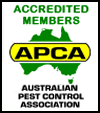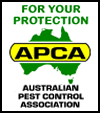|
 |

INCORPORATED
1987 |
ACCREDITED
APCA Members are required to possess TAFE or APCA Pest Control Certificate
QUALIFIED Technicians with extensive field work experience
in the pest control service industry

|
|
|
| |
The Australian
Pest Controllers Association Inc |
| |
www.pestcontrol.org.au
CONSUMER PROTECTION ADVICE
Don't do a thing - until you give APCA a ring - 1300 660 200 |
| |
Letter
to the Editor - PEST MANAGER Magazine - Jan 2004 - letter by Glenn DuBois, APCA Secretary |
| |
Pest Manager magazine is an AEPMA sponsored publication |
| |
In
the September 2003 issue of the Pest Manager magazine, the
AEPMA President was quoted, as saying in effect, if you
don’t support the PestCert scheme you’re asking
to have “SHONK” stamped on
your forehead.
In another article, the PestCert promoter Mr Ron DeGroot
declares that the ACCC “stop supply” authorisation
was a key plank of PestCert, and the ACCC supported the
PestCert objectives.
The draft PestCert - Code of Conduct, states that AEPMA
members will be expelled if they are denied PestCert accreditation.
Such expulsions would require an extra-ordinary resolution
of members to change the Constitution to make this policy
legal. I wonder why the AEPMA Board have not first put this
proposition to their members for a vote?
On the basis of my investigations, the ACCC does not support
the PestCert “stop supply” scheme, as it has
not even received a written proposal to consider. When they
do, the PestCert document will be widely circulated in the
pest control industry by the ACCC and they will request
interested parties to make written submissions in relation
thereto.
The ACCC policy has been to refuse any such industry-wide “stop supply” proposal that could create a monopoly
in the hands of a private sector group.
I would rate the prospect of the ACCC supporting
the Pestcert “stop supply” scheme as absolutely
zero. There is no other such service industry scheme
with ACCC “stop supply” authorisation. AgSafe
relates to pesticide distributors. The end user, the farmer
is NOT required to be AgSafe accredited.
The ACCC refused on 19th March 2003 a proposal by the Dry
Cleaning Institute of Australia to restrict supply of dry
cleaning solvents, even though there was no government licensing
of individuals using these solvents.
To avoid confusion it should be clarified in the
Pest Manager magazine that joining the PestCert scheme is
purely “optional” and NOT in any way compulsory.
The AEPMA PestCert promoters are waving a big stick made
of butter.
As you are aware, I am a keen supporter of a proper PCO
licensing system to protect the public and thereby gain
increased benefits for all professional and ethical PCO’s
in the industry.
Another major shortcoming is that the AEPMA PestCert proposals
do not address the industry’s needs or recognise the
variations in the type of specialist work PCO’s carry
out. For example, a PCO with a TAFE Pest control Certificate
and many years experience, and who services only commercial
kitchens and restaurants - would need 2 to 3 days further
training each and every year to comply with the PestCert
scheme.
Likewise, all office phone enquiry sales staff are required
to have 1 to 2 days training every year, even if they have
the TAFE Pest Control Certificate and many years experience
in the business. The cost of this unnecessary training is
yet to be clarified, but I estimate the PestCert scheme
will cost the industry millions of dollars.
How can the AEPMA PestCert ask for industry backing as a
credible proposal whilst the AEPMA PestCert money trail
and contractual terms with Mr DeGroot remain a closely guarded
secret? In addition, the AEPMA over the years has focussed
primarily on collection of member fee income rather than
professional standards or tertiary qualifications for AEPMA
membership.
In fact, industry standards have dramatically declined in
recent years as a result of “private sector” assessment of trainees to obtain a PCO license from the
State Govt Health Department or WorkCover PCO licensing
authority.
We should lobby the various State Parliaments (including
the Opposition), the media and conduct a pro-active advertising
campaign to push for an independent and effective PCO licensing
system, preferably administered by the relevant State Govt
- Dept of Consumer Affairs. In NSW they handle
the licensing of builders, real estate agents, etc and are
seen to be totally independent and are most active on consumer
protection matters (not just health and safety).
The
TAFE Pest Control Certificate should be mandatory for a
PCO license. A specific committee made up of representatives
from TAFE, Dept of Consumer Affairs, Health Dept and 3 elected
industry representatives should set the TAFE course content
and exams to ensure it is practical in content. Associations
and industry training groups can provide ongoing relevant
training based upon need and quality of content, including
training notes and materials on their website.
The PCO licenses should comprise several specialist
categories, such as (1) termite control (2) commercial
(3) fumigation, and (4) general domestic premises.
Most importantly, there should be a separate PCO licence
category of Technical Director for those
who want to operate or manage a PCO business. Such a person
should be required to have at least 4 years relevant practical
experience in the industry.
A low cost quality assurance requirement for PCO business
registration should be that for each licensed PCO employed,
only one trainee (unsupervised) could also be employed.
This
is the so-called “one to one rule” that operated in the NSW under the PCO licensing system
until the private sector assessment system took over from
the TAFE Pest Control Certificate, as the sole qualification
to obtain a PCO license in NSW.
Andy Royal - PEST MANAGER - Editor’s
response: The contact between AEPMA and PestCert
(Ron DeGroot’s company), referred to in this letter,
is a commercial in confidence agreement and, as such, its
terms are not for public disclosure. Demanding public disclosure
of commercial agreements between the two parties would be
akin to demanding the disclosure of a company’s or
person’s commercial dealings with its clients, which,
I am sure, would be unacceptable.
|
|
APCA is an
independently incorporated association - since 1987
|

